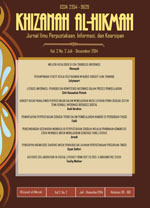Authors Collaboration in Digital Literacy From 1997 to 2013 : a bibliometric study
Abstract
The study aims to identify the degree of author collaboration among scholars in digital literacy articles published from 1997-2013. The 661 digital literacy articles were gathered and indexed by Web of Science. The study found that the degree of author collaboration was 0.62 or 62%, indicating that more than a half of 661 articles were multi-authored papers. In addition, America Continents have proportionally contributed in discussing about digital literacy topic. It was then followed by European countries, Australia/Oceania, Asia, and Africa respectively. The study also figured out that Eszter Hargittai was the most prolific author who has published 8 articles in different journals on this particular topic.
Downloads
References
Abu Bakar, A. B., & Putri Junurham, N. L. N. (2013). International collaboration in information and communication technology of Malaysian scholars. 2013 5th International Conference on Information and Communication Technology for the Muslim World.
Ahmad, S. M. Z., and Shuva, N. Z. (200?). Author Productivity in Library and Information Science (LIS) Research of Bangladesh: testing Lotka’s law and related phenomena.
Abu Bakar, A. B. ( ). Bibliometric Methods in Library and Information Science Research.In......
Andres, A. (2009). Measuring Academic Research; how to undertake a bibliometric study. Oxford. Cambridge. New Delhi: Chandos Publishing.
Bakri, A., and Willet, P. (2008). The Malaysian Journal of Library and Information Science 2001-2006: a bibliometric study, Malaysian Journal of Library and Information Science, Vol. 13 No. 1, pp. 103-116.
Bawden, D. (2001). Information and digital literacies. Journal of Documentation, Vol. 57 No. 2, pp. 218-259.
Cheng, M.Y., et al. (2013). Patterns of co-authorship and research collaboration in Malaysia. Aslib Proceedings: New Information Perspectives, Vol. 65 No. 6, pp. 659-674.
Elango, B., & Rejendran, P. (2012). Authorship Trends and Collaboration Pattern in the Marine Sciences Literature: a sciencetometric study. International Journal of Information Dissemination and Technology.Vol. 2 No. 3, pp. 166-169.
Gilster, P. (1997). Digital fusion: defining the intersection of content and communications. In Allan Martin and Dan Madigan (Eds.), Digital literacies for learning (pp. 42-50). London. Facet Publishing.
Hague, C., & Payton, S. (2010). Digital literacy across the curriculum, available in www.futurelab.org.uk/projects/digital-participation.
Hayati, Z., and Didegah, F. (2010). International Scientific Collaboration Among Iranian Researchers during 1998-2007. Library Hi Tech, Vol. 28 No. 3, pp. 433-446.
Jena, K. L., Swain, D, K., and Sahoo, K. C. (2012). Scholarly Communication in Journal of Finance Crime2006-2010: a bibliometric study, Journal of Finance Crime, Vol. 19 No. 14, pp. 371-383.
Katz, J.S., & Martin, B.R. (1997). What is research collaboration?. Research Policy, Vol. 29, pp. 1-18.
Laraviere, V., Sugimoto, C. R., and Cronin, B. (????). A Bibliomeric chronicling of Library and Information Science’s first hundred years.
Martin, A. (2006). Literacies for the digital age: preview of part I. In Allan Martin and Dan Madigan (Eds.), Digital literacies for learning (pp. 3-25). London. Facet Publishing.
Nasah, A., et al. (2010). The digital literacy debate: an investigation of digital propensity and information and communication technology, Education Tech Research Dev, Vol. No.58, pp. 531-555.
Pinto, M., Escalona-Fernandez, M. I., and Pulgarin, A. (2012). Information Literacy in Social Science and Heal Sciences: a bibliometric study (1974-2011), Sciencetometrics, Vol. 95, pp. 1071-1094.
Pool, C. R. (1997). A New Digital Literacy: a conversation with Paul Gilster. Integrating Technology into Teaching, Vol. 55, pp. 6-11.
Pritchard, A. (1969). Statistical Bibliography or Bibliometrics? Journal of Documentation, Vol. 25 No. 5, pp. 348-349.
Puvenesvary, M., et al. (2008). Qualitative Research: Data Collection & Data Analysis Techniques. Universiti Utara Malaysia Press.
Shah, A., et al. (2011).Research Methodologies: a practical approach.Research Management Centre.International Islamic University Malaysia.
Sin, S. J. C. (200?). Are Library and Information Science Journals Becoming More Internationalized?: a longitudinal study of authors’ geographical affiliations in 20 LIS journals from 1981 to 2003.
Subramanyam, K. (1983). Bibliometric studies of research collaboration: a review, Journal of Information Science, Vol. 6, pp. 33-38.
Swain, C., Swain, D. K., and Rautaray, B. (2013). Bibliometrics analysis of Library Review from 2007-2011.Library Review, Vol. 62 No. 8/9, pp. 602-618.
By submitting your manuscript to our journal, you are following Copyright and License

